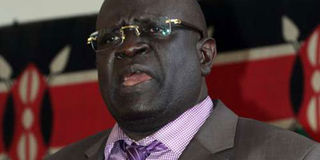More queries relating to routing of exam cheats

The Kenya National Examination Council [Knec] chairman George Magoha addresses education stakeholders at Shimo La Tewa High School during the release of 2016 KCSE results on December 29, 2016. PHOTO | LABAN WALLOGA | NATION MEDIA GROUP
What you need to know:
- Whatever they did they certainly have accomplished a feat that a lot of Kenyans feel is worth talking about.
- Stakeholders must be brought together to look at all the loose ends related to processing examination results.
The most talked about issue in the last few weeks is Dr Fred Matiang’i’s and Prof George Magoha’s efforts at ending examination cheating.
Whatever they did they certainly have accomplished a feat that a lot of Kenyans feel is worth talking about.
While the initial sentiment was that finally examination cheats have been caught up with, at this point, when the real implications are becoming clearer, there are more questions than answers.
The other day somebody wondered whether, because the operation was carried out so effectively, someone knew what the problem was and, therefore, knew what to do.
Is it possible that the perpetrators of the crime were known? Who were they?
Were they within the Kenya National Examinations Council or outsiders or both?
Is it possible there is other information that we are not being given?
What, for instance, did the chairman, Prof Magoha, mean when he said last year that those “stupid As” of yester-years would not be seen under his watch?
ICT is now part of our life and, while for some people it makes life a little complicated, for the experts it makes life easier, manageable and more efficient.
Long ago I used to hear people saying something like: with computers, it is “garbage in garbage out”.
THE PROCESS
Once you know what you want and you know how to do it, all one needs to do is to programme it and it will give you what you want.
Could there have been something of this sort with the current results?
Or is it possible that the standardisation that used to happen in the past was not applied this time round?
We need to know. Those who know how the Examination Council works tell us that over the years there has been a reorganisation of grading scales according to performance in order to arrive at a normal performance curve.
Was that applied in processing last year’s exam results?
They need to tell us that but suffice to say that whatever good was achieved in the just-concluded examination process, critical minds have been left with more questions than answers.
Kenyans are creative people and, therefore, one can bet that sooner or later, someone somewhere will come up with a new trick.
This whole matter is not just a technical issue.
It is also a matter that has moral, political and commercial implications.
Stakeholders must be brought together to look at all the loose ends related to processing examination results.





